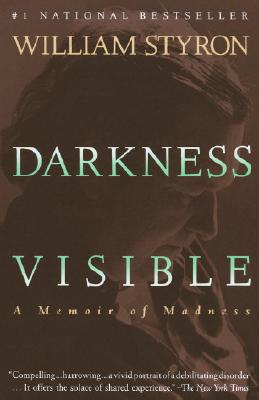“It is better to light a candle than to curse the darkness.”
There are many ways to describe depression. The trouble is, if you survive it, you are usually eager to put the past behind you and too weary from the battle you’ve waged to sit down and write the list of metaphors that come to mind.
William Styron, in Darkness Visible: A Memoir of Madness, is brave enough to revisit the darkest hour of his life and energetic enough to record it in detail. His memoir is a gift to anyone seeking to understand the nature of the illness, its progression, its symptoms, and the helplessness of those in its grip.
In fewer than one hundred pages, with an elegant, spare, and masterful use of the English language, Styron chronicles his battle with madness, his attempts to seek help from doctors ill-equipped to handle a patient as ill as he, and the despair he felt in trying to maintain any semblance of a normal life as he lost his grasp on reality. This sharply drawn chronicle drives a stake through the heart of the stigma that surrounds the disease.
We follow many months of his journey through madness. We watch him fail to behave appropriately at a dinner in Paris honoring his literary achievements, we watch him lose his voice, his normal gait, his ability to smile or converse, we witness his childlike desperation at misplacing ordinary possessions like his eyeglasses or his newspaper. We watch him grasp at these objects because they have become symbols of his old normal life. He is like a man going blind and turning in circles to find remaining patches of light. At last we see him find salvation at a hospital, where he describes the relief of the disease’s capitulation and his gradual return from the brink of hanging himself from the rafters of his farmhouse.
If the man who wrote Sophie’s Choice wandered through grocery shops trailing after his wife like a toddler, helpless and frightened, if the man who wrote The Confessions of Nat Turner could be reduced to panic by a flock of birds migrating overhead, if a man of such cultural worth and intellect could be immobilized by irrational grief and dread, then how can anyone be ashamed to suffer the same fate and, more importantly, to feel the right to ask loved ones and society for help?
Those who have suffered this peculiar agony know that to be depressed is to live in a state of great confusion and deep shame, to be strapped to a treadmill of psychic anguish. Even if loved ones are aware that a relative is “out of sorts” or even uses the word “depressed” to describe his condition, they usually fail to grasp the degree to which their afflicted relation is disabled. The right doctors, the right medications, the right therapies: All of these things need be sorted out and monitored by those on the shore while calling to the drowning patient that a lifeboat is on the way.
Only our relentless determination to pull the sufferer ashore and place him in capable medical hands will save him. Styron leaves no room for denying the absolute necessity of aggressive intervention. His book has no doubt saved lives, and could save many more.
After reading such a personal story, told with both grace and a dollop of laugh-out-loud humor (see his description of Art Therapy on the ward of his hospital), it is easy to honor depression’s right to sit at the table with other major illnesses. Styron’s story is a must-read for anyone interested in the human condition, and particularly for those personally touched by the clammy hand of mental illness.
At the end of his odyssey, he leaves us with this, and we believe him:
“Depression is not the soul’s annihilation . . . it is conquerable. Whoever has been restored to health has almost always been restored to the capacity for serenity and joy, and this may be indemnity enough for having suffered the despair beyond despairs.”





